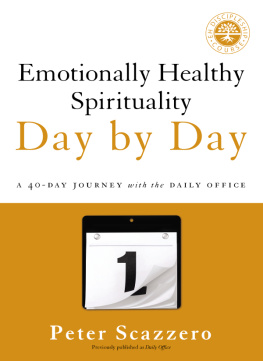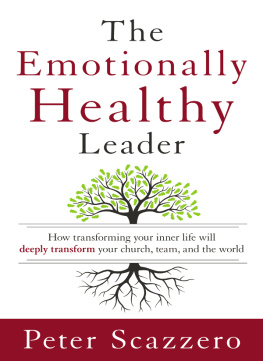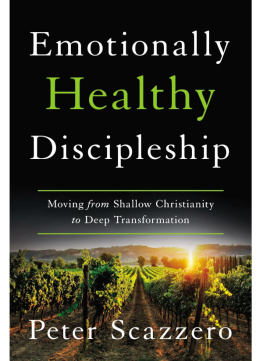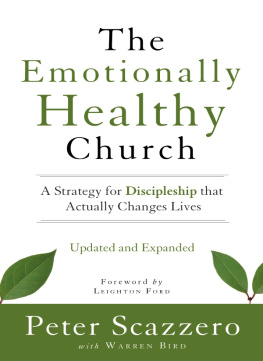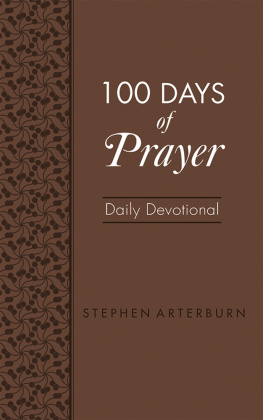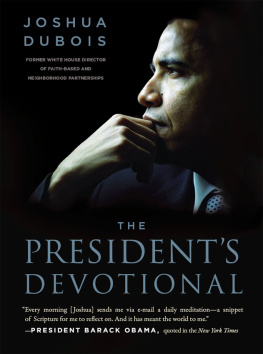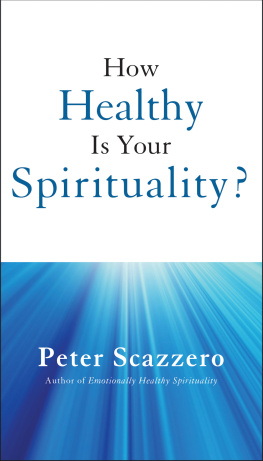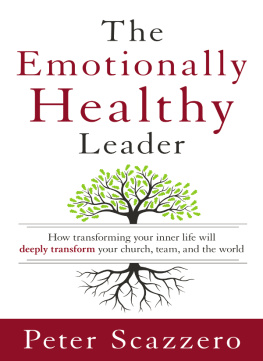
ZONDERVAN
Emotionally Healthy Spirituality Day by Day
Copyright 2008, 2014 by Peter Scazzero
Previously published as The Daily Office
Requests for information should be addressed to:
Zondervan, 3900 Sparks Dr. SE, Grand Rapids, Michigan 49546
ISBN 978-0-310-34116-1 (softcover)
ePub Edition August 2017: ISBN 978-0-310-34108-6
Some material adapted from Emotionally Healthy Spirituality by Peter Scazzero (Nashville: Nelson, 2006). All rights reserved. Used by permission.
Any Internet addresses (websites, blogs, etc.) and telephone numbers in this book are offered as a resource. They are not intended in any way to be or imply an endorsement by Zondervan, nor does Zondervan vouch for the content of these sites and numbers for the life of this book.
All rights reserved. No part of this publication may be reproduced, stored in a retrieval system, or transmitted in any form or by any means electronic, mechanical, photocopy, recording, or any other except for brief quotations in printed reviews, without the prior permission of the publisher.
Author is represented by Christopher Ferebee, Attorney and Literary Agent, www.christopherferebee.com
Cover design: AbneyRanville
Cover image: jgroup / iStockphoto
Interior design: Katherine Lloyd, The DESK
Interior illustration: iconeer / iStock
First printing June 2014
Information about External Hyperlinks in this ebook
Please note that footnotes in this ebook may contain hyperlinks to external websites as part of bibliographic citations. These hyperlinks have not been activated by the publisher, who cannot verify the accuracy of these links beyond the date of publication.
Contents

Appendices

I want to thank Geri, my wife, my best friend, and my favorite companion in The Journey. She has spent countless hours prayerfully pondering and experimenting with these Daily Offices in a variety of contexts. Her work crafting thoughtful questions is meant to touch the soul and lead us to a personal experience of God. What a gift!
Thank you.

Most Christians today are struggling spiritually, especially when it comes to spending time with God. You may be one of them. If so, it might help you to know that the struggle is real, and that you are far from alone.
Throughout more than thirty years of being a pastor, Ive encountered this struggle in virtually every person and in every corner of the churchfrom people in our own international congregation in Queens, New York, to Christian leaders in a variety of settings and denominations throughout the world. If you asked me to summarize what Ive observed about the spiritual condition of believers today, here is what Id say. We are
feeling stuck in our spiritual journey with Christ;
living off of other peoples spirituality;
scattered, fragmented, and uncentered;
tiredphysically, spiritually, and emotionally;
existing with only a one-inch-deep spirituality;
praying and communing with God very little;
busy and not very intentional in pursuing Jesus;
struggling to stop our life on the run.
The bottom line? Too many of us have a relationship with Jesus that is seriously underdeveloped. We talk to God, or even perhaps at God, but dont actually listen to him very much. And that is nothing less than a global spiritual crisisespecially when we consider that God intends for his love to reach the world through us!
The outlook may seem bleak. But what if I told you that, while the problem is real and pervasive, it is far from a lost cause? There is a way to live a relaxed, unhurried, contented life in Jesus amidst the pressures and difficulties of life. There is a way to mature into spiritual adulthood anchored in the love of God. There is a way to remain thoughtful when triggered in conversations and listen for Gods voice. There is a way to surrender to Gods love and will consistentlyeven when it is difficult. There is a way to give our lives in service to others without becoming chronically exhausted.
How? The answer lies in intentionally rearranging our days to integrate the Christian practice of being still and silent in Gods presence.
AN ANCIENT AND REVOLUTIONARY SPIRITUAL DISCIPLINE
The purpose of this book is to introduce you to this spiritual discipline that is both ancient and revolutionary. Its called the Daily Office. The Daily Office provides a structured way of spending time with God each day, but it differs from what we tend to think of as quiet time or devotions. Quiet time and devotions normally take place once a day, usually in the morning, and focus on getting filled up for the day or on interceding for the needs of others. The Daily Office takes place at least twice a day, and it is not so much about turning to God to get something as it is turning to God to simply be with him.
The goal of the Daily Office is to pay attention to God throughout the entire day and in the midst of our activities. This is the great challenge for all of us. The enormous pressure of the world and our own stubborn self-will make it extraordinarily difficult to sustain any consistent awareness of Gods presence. But it is far from impossible.
So why is it called the Daily Office? The word office comes from the Latin word opus, or work. For the early church, the Daily Officepraying at fixed times throughout the daywas always the first work of God to be done. Nothing was to interfere with that priority.
But this practice of fixed-hour prayer is one that actually long predates the early church. Three thousand years ago, King David practiced set times of prayer seven times a day (Psalm 119:164). The prophet Daniel prayed three times a day (Daniel 6:10). Devout Jews in Jesus time prayed at morning, afternoon, and evening. Such set times of prayer were one of the Israelites great spiritual and cultural treasures, a practical way to keep their lives centered on loving God at all times. Even after the resurrection, Jesus disciples continued to pray at certain hours of the day (Acts 3:1; 10:223).
It was about AD 525 when a monk named Benedict created a formal structure for these prayer times that he anchored in eight Daily Offices (including one for monks in the middle of the night). Prayer was the framework for the day, and everything else in their lives was ordered around it. Benedict wrote: On hearing the signal for an hour of the divine office, the monk will immediately set aside what he has in hand and go with utmost speed. Indeed, nothing is to be preferred to the Work of God [the Daily Office].
All of these peoplefrom the ancient Israelites to first-century disciples and early Christian leaders like Benedictrealized that stopping to be with God, by means of the Daily Office, was the key to creating a continual and easy familiarity with Gods presence. And having practiced the Daily Office for over fourteen years, I can affirm it has done that for me. Routinely setting aside small units of time for morning, midday, and evening prayer infuses the activities of my day with a deep awareness of the sacredof God. In those moments, I remember that all time is Gods time. There is no division between the sacred and the secular.
Next page
